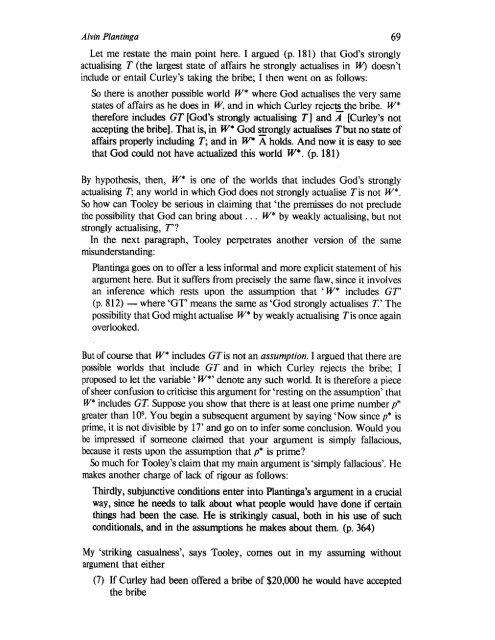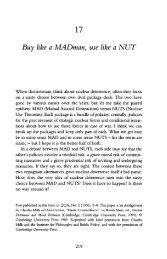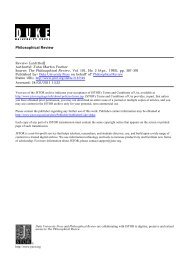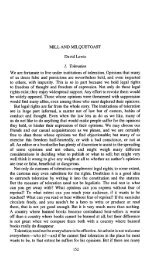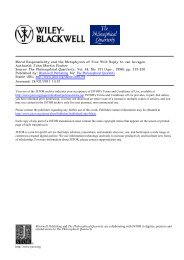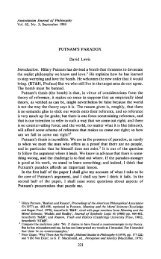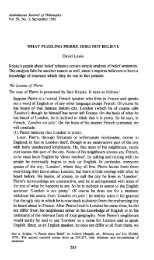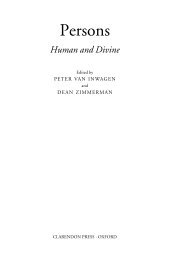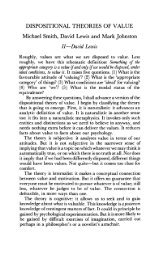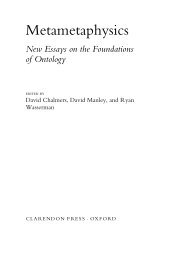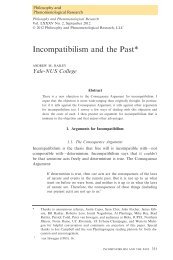Tooley and Evil - Andrew M. Bailey
Tooley and Evil - Andrew M. Bailey
Tooley and Evil - Andrew M. Bailey
- No tags were found...
Create successful ePaper yourself
Turn your PDF publications into a flip-book with our unique Google optimized e-Paper software.
Alvin Plantinga 69Let me restate the main point here. I argued (p. 181) that God's stronglyactualising T (the largest state of affairs he strongly actualises in W) doesn'tinclude or entail Curley's taking the bribe; I then went on as follows:So there is another possible world W* where God actualises the very samestates of affairs as he does in W, <strong>and</strong> in which Curley rejec~the bribe. W*therefore includes GT [God's strongly actualising T] <strong>and</strong> A [Curley's notaccepting the bribe]. That is, in W* God s~ongly actualises Tbut no state ofaffairs properly including T; <strong>and</strong> in W* A holds. And now it is easy to seethat God could not have actualized this world W*. (p. 181)Downloaded by [University of Notre Dame] at 11:51 14 April 2012By hypothesis, then, W* is one of the worlds that includes God's stronglyactualising T; any world in which God does not strongly actualise Tis not W*.So how can <strong>Tooley</strong> be serious in claiming that 'the premisses do not precludethe possibility that God can bring about... W* by weakly actualising, but notstrongly actualising, T'?In the next paragraph, <strong>Tooley</strong> perpetrates another version of the samemisunderst<strong>and</strong>ing:Plantinga goes on to offer a less informal <strong>and</strong> more explicit statement of hisargument here. But it suffers from precisely the same flaw, since it involvesan inference which rests upon the assumption that 'W* includes GT'(p. 812) -- where 'GT' means the same as 'God strongly actualises T.' Thepossibility that God might actualise W* by weakly actualising Tis once againoverlooked.But of course that W* includes GTis not an assumption. I argued that there arepossible worlds that include GT <strong>and</strong> in which Curley rejects the bribe; Iproposed to let the variable' W*' denote any such world. It is therefore a pieceof sheer confusion to criticise this argument for 'resting on the assumption' thatIV* includes GT. Suppose you show that there is at least one prime number p*greater than 109. You begin a subsequent argument by saying 'Now since p* isprime, it is not divisible by 17' <strong>and</strong> go on to infer some conclusion. Would yoube impressed if someone claimed that your argument is simply fallacious,because it rests upon the assumption that p* is prime?So much for <strong>Tooley</strong>'s claim that my main argument is 'simply fallacious'. Hemakes another charge of lack of rigour as follows:Thirdly, subjunctive conditions enter into Plantinga's argument in a crucialway, since he needs to talk about what people would have done if certainthings had been the case. He is strikingly casual, both in his use of suchconditionals, <strong>and</strong> in the assumptions he makes about them. (p. 364)My 'striking casualness', says <strong>Tooley</strong>, comes out in my assuming withoutargument that either(7) If Curley had been offered a bribe of $20,000 he would have acceptedthe bribe


